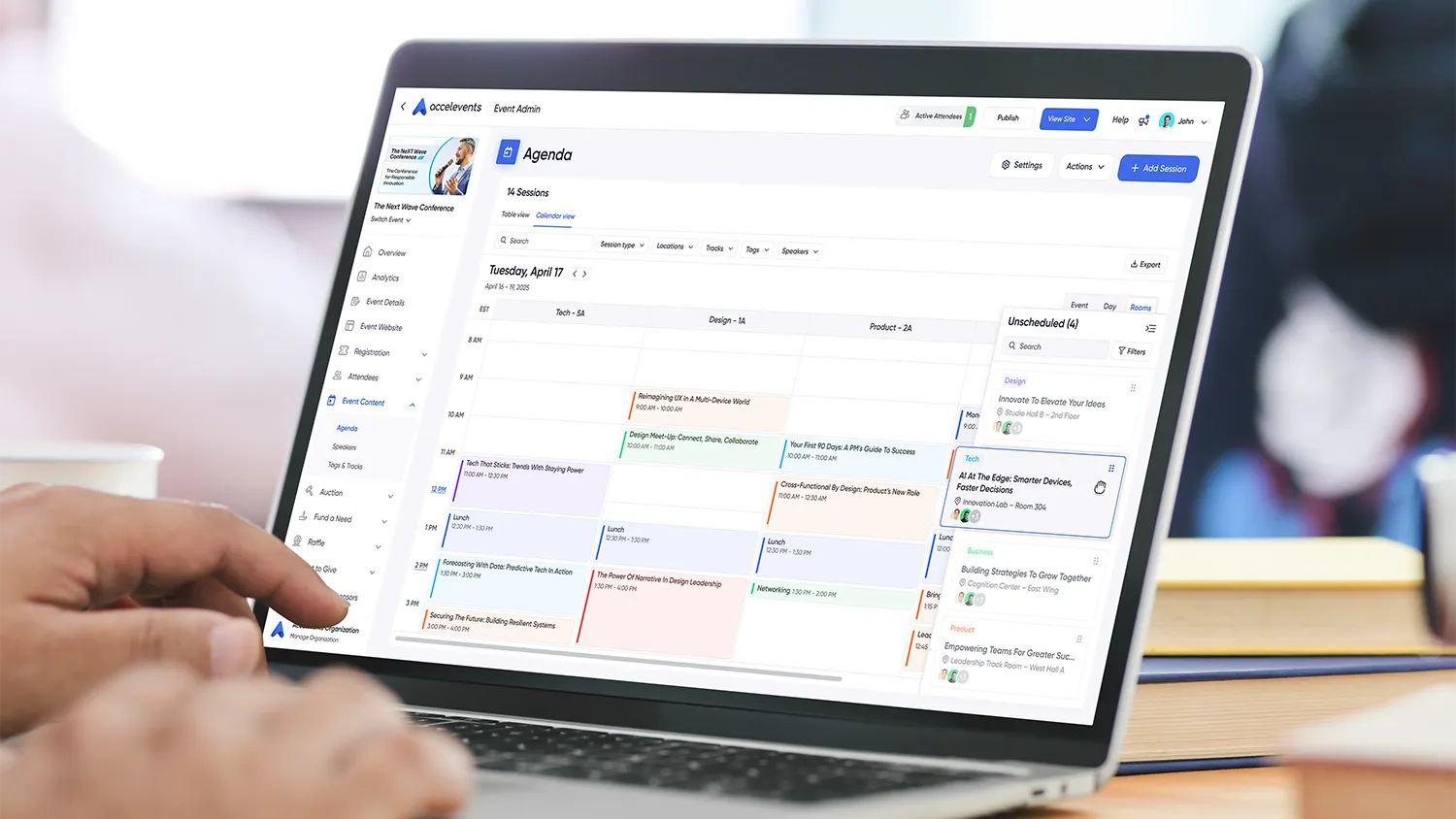Event budget planning is tricky. Some of us struggle with adhering to a budget, but most find the initial step of drafting a feasible budget to be the real challenge. That's because when planning an event budget, there is a lot that event planners must consider. In addition to necessities like venue costs and the event staff, you’ll also want to allow for unexpected expenses, emergency funds, and hidden fees that crop up.
To help you out, Accelevents has mapped out eight event budgeting tips provided by expert event planners. Use these tips to help you prepare for budgeting uncertainties, maximize your return on investment, and ensure event success.
1. Identify Your Event Budgeting Goals And Primary KPIs
Before you tackle your event budget, make sure you're clear on your event's goals and key performance indicators (KPIs), like attendance numbers, attendee satisfaction, event ROI and revenue targets. The budgeting phase typically falls after you've defined these main objectives but before you start the detailed planning.

Consider this example of how to align your event goals with KPIs. Suppose your main goal is to generate revenue through ticket sales. Start by setting a target sales figure – what you need to break even, what you ideally want to earn, and your optimal revenue goal.
Then, revisit your event plan to assess the expected size of your event and what you can realistically manage. Your ticket pricing will be influenced by factors like venue costs, staff payments, and catering expenses.
As you progress, you'll be able to determine the ticket price or the volume of ticket sales required to cover your overhead costs and meet your financial targets.

2. Use Past Data For A Starting Estimate, But Don't Stop There
Event planners often base their event budgets on past experiences, analyzing data from similar events to understand costs and the significance of different expense categories.
Using historical data is a good starting point, but ensure your upcoming event closely resembles previous ones in terms of event type (online, hybrid, or in-person event), location, size, and branding needs. Otherwise your research will not help to accurately extrapolate costs.
Also, avoid relying solely on data from 2020-2022. Current factors like inflation, supply chain issues, and rising interest rates have affected costs. Adjust your overall budget accordingly and confirm your estimates by consulting your professional network for additional cost insights.
Lastly, keep two important things in mind:
1. Trust your instincts on expense ratios and trends to ensure your budget reflects your experience.
2. If you tend to go over budget, set up a contingency fund to avoid overspending. This is especially crucial in times of inflation.

3. Build A Comprehensive List Of Event Budgeting Expenses
Your event expense categories are probably the most essential aspect of your budget planning process. Here is a list of line items to populate your event budget template with:
Venue expenses:
- Venue rental
- On-site staff and event team
- Food and beverage; catering
- Event tech, like audio/visual (will be more expensive for hybrid events)
- Speakers and other forms of entertainment like MCs
- Accommodations and transportation near or around the event venue
- Security
- Other on-site staffing, like network engineers, videographers, technical masters, event planners, and event coordinators
- Swag and other handouts onsite
- Physical printouts, posters, signage, and banners
Marketing and event promotion:
- Paid content marketing and paid ads
- Event marketing
- Affiliate or influencer fees
- Social media advertising
- Printed marketing materials
- Graphic design for event branding or logos
- Website design and/or hosting (if not included in your event management technology)
Event management technology:
- Event platform fees
- Payment processing fees
- Event website hosting
- Mobile event app
- Lead capture tools
- On-site check-in and registration
- Virtual event streaming or integration
- Data and analytics
Since these costs can easily add up, it’s important to cut costs where you can. Be sure to evaluate thoroughly how those cuts will impact the event experience and your ability to work efficiently!
Helpful tip: When it comes to spending on event software, one way to avoid the negative impact of cost cuts is to rebundle your tech. Investing in a comprehensive event management software like Accelevents can actually save money. The platform handles everything from marketing before the event to post-event surveys in one platform, so you end up spending less than you would on purchasing multiple separate tools.
Additionally, an integrated platform like Accelevents simplifies your workflow, cutting down the need for extra staff to oversee various aspects of your event.

4. Dont Settle: Get Multiple Vendor Quotes
Your event software provider will be one of the most significant costs associated with your event. So be sure to shop around to get the best quotes.
Get multiple vendor quotes and inform the vendors that you are searching for competitive quotes to get the best rate. Head over to our guide to selecting the best event software for tips and tricks on how to select the best event software for your needs. We have also prepared an RFP guide to help you optimize the vendor selection for your next event.
5. Create An Estimated Balance Sheet Of Income And Expenses
Once you’ve got a good idea of what you expect to spend for this event, you can then revisit your ticket sales and how this event will make you money. Invest in an event template, that can help you get a better idea of your expenses.
Suppose you estimate all of your expenses and see that you need to sell 2,000 tickets for $1,000 each to break even. In that case, you’ll likely need to evaluate
a) whether you can sell that many tickets at that price,
b) whether it’s worth it to do so, and
c) where you could cut costs to offer more affordable ticket prices (if that’s part of your goal).
Begin to map out different sales estimates so that you can plan your sales strategies. If you need to keep ticketing high, you’ll likely have a direct marketing campaign that suits this.
Your expenses shouldn’t be forcing you to break even, either, unless you’re determined to use long-term marketing tactics.

6. Re-Evaluate Your Event Budgeting Goals To Identify Areas For Saving Money
More often than not, if this is your first event, you might find that you are overzealous in planning event expenses. Try to find a balance. Too strict a budget can also lead to problems during the event.
Of course it's important to always seek cost-saving opportunities, as this boosts your ROI or profit. Opting for a scalable event technology platform, like Accelevents, provides a transparent view of your earnings from each ticket sale, helping you manage finances more effectively.
Consider the ways that the event venue can cut costs. Ask your lawyer to review the contract so that your brand does not become liable for any damages or accidents that happen at the event. You could also find some loopholes where you could cut costs associated with the venue, catering, event supplies, marketing, and more. If you can’t cut costs, then consider other ways in which this event can make you money, including sponsorship revenue, selling add-ons or fundraising.
7. Always Account For Incidentals or Emergencies
Even the most perfectly planned event will incur some unexpected costs. Something is bound to crop up from needing last-minute marketing materials to significant issues with the event tech. You may find that a speaker can no longer present, and you might have to make up for it in other, more expensive ways.
Have a rainy day fund that can be accessed on-site for issues like that. Consider budgeting an extra 10-20% of your event budget to have on hand. You can even source some of this cash with a portion of the ticket sales. Any unused amounts will go back to profit. With this extra cash on hand, you’ll be well-prepared for any hiccups that come your way.
8. Keep Your Event Budgeting Initiatives Documented And Expenses Organized
As you move through the event budget, be sure to keep all your receipts, document the expenses coming in regularly and any known, large costs coming in later. You’ll need to report these expenses later on for tax and accounting purposes, and having this data organized now will set you up for success.
Keep a spreadsheet with monthly expenses to know what you need each month leading up to the event. You may need to make certain expenses early on to offset major costs closer to the event. This will also keep your team organized when it comes to planning.
Budgeting for any size event can be tricky. However, as an event organizer, you have to keep your eye on budgets so that your event can maximize profits and perform successfully. Consider bringing in an accountant or financial planner to help with budget management.
We can also help you find the right tools and software for your event budget. Get in touch today; our event experts would be more than happy to help you with your event planning process.








